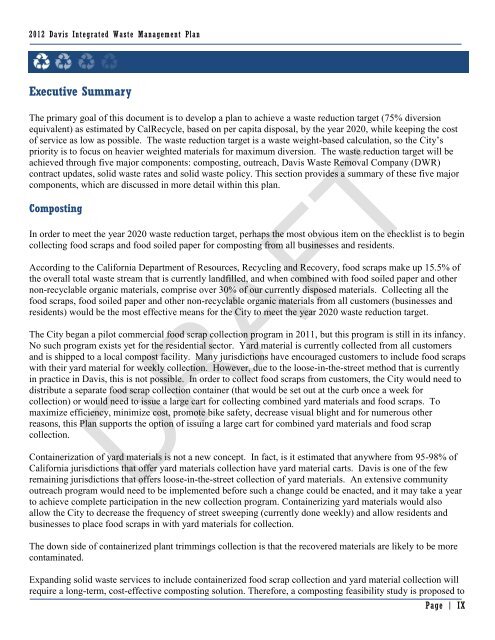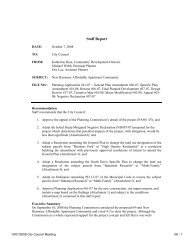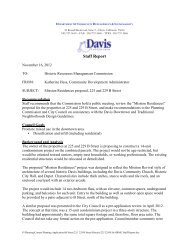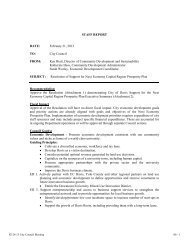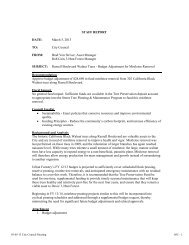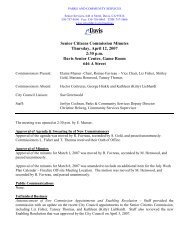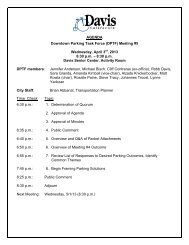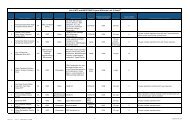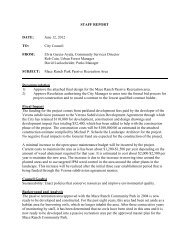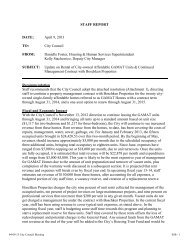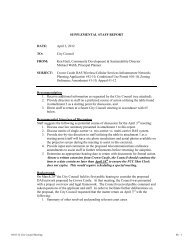10 Draft Integrated Waste Management Plan - City Council - City of ...
10 Draft Integrated Waste Management Plan - City Council - City of ...
10 Draft Integrated Waste Management Plan - City Council - City of ...
Create successful ePaper yourself
Turn your PDF publications into a flip-book with our unique Google optimized e-Paper software.
2012 Davis <strong>Integrated</strong> <strong>Waste</strong> <strong>Management</strong> <strong>Plan</strong><br />
Executive Summary<br />
The primary goal <strong>of</strong> this document is to develop a plan to achieve a waste reduction target (75% diversion<br />
equivalent) as estimated by CalRecycle, based on per capita disposal, by the year 2020, while keeping the cost<br />
<strong>of</strong> service as low as possible. The waste reduction target is a waste weight-based calculation, so the <strong>City</strong>’s<br />
priority is to focus on heavier weighted materials for maximum diversion. The waste reduction target will be<br />
achieved through five major components: composting, outreach, Davis <strong>Waste</strong> Removal Company (DWR)<br />
contract updates, solid waste rates and solid waste policy. This section provides a summary <strong>of</strong> these five major<br />
components, which are discussed in more detail within this plan.<br />
Composting<br />
In order to meet the year 2020 waste reduction target, perhaps the most obvious item on the checklist is to begin<br />
collecting food scraps and food soiled paper for composting from all businesses and residents.<br />
According to the California Department <strong>of</strong> Resources, Recycling and Recovery, food scraps make up 15.5% <strong>of</strong><br />
the overall total waste stream that is currently landfilled, and when combined with food soiled paper and other<br />
non-recyclable organic materials, comprise over 30% <strong>of</strong> our currently disposed materials. Collecting all the<br />
food scraps, food soiled paper and other non-recyclable organic materials from all customers (businesses and<br />
residents) would be the most effective means for the <strong>City</strong> to meet the year 2020 waste reduction target.<br />
The <strong>City</strong> began a pilot commercial food scrap collection program in 2011, but this program is still in its infancy.<br />
No such program exists yet for the residential sector. Yard material is currently collected from all customers<br />
and is shipped to a local compost facility. Many jurisdictions have encouraged customers to include food scraps<br />
with their yard material for weekly collection. However, due to the loose-in-the-street method that is currently<br />
in practice in Davis, this is not possible. In order to collect food scraps from customers, the <strong>City</strong> would need to<br />
distribute a separate food scrap collection container (that would be set out at the curb once a week for<br />
collection) or would need to issue a large cart for collecting combined yard materials and food scraps. To<br />
maximize efficiency, minimize cost, promote bike safety, decrease visual blight and for numerous other<br />
reasons, this <strong>Plan</strong> supports the option <strong>of</strong> issuing a large cart for combined yard materials and food scrap<br />
collection.<br />
DRAFT<br />
Containerization <strong>of</strong> yard materials is not a new concept. In fact, is it estimated that anywhere from 95-98% <strong>of</strong><br />
California jurisdictions that <strong>of</strong>fer yard materials collection have yard material carts. Davis is one <strong>of</strong> the few<br />
remaining jurisdictions that <strong>of</strong>fers loose-in-the-street collection <strong>of</strong> yard materials. An extensive community<br />
outreach program would need to be implemented before such a change could be enacted, and it may take a year<br />
to achieve complete participation in the new collection program. Containerizing yard materials would also<br />
allow the <strong>City</strong> to decrease the frequency <strong>of</strong> street sweeping (currently done weekly) and allow residents and<br />
businesses to place food scraps in with yard materials for collection.<br />
The down side <strong>of</strong> containerized plant trimmings collection is that the recovered materials are likely to be more<br />
contaminated.<br />
Expanding solid waste services to include containerized food scrap collection and yard material collection will<br />
require a long-term, cost-effective composting solution. Therefore, a composting feasibility study is proposed to<br />
Page | IX


